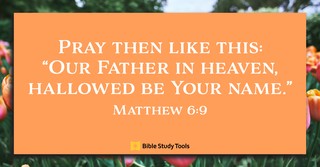
- Recent Translations
- All Translations
Matthew 6:7
Share
Settings
Matthew 6:7 Meaning and Commentary
But when ye pray, use not vain repetitions
Saying the same things over and over again,
as the Heathens do,
as the worshippers of Baal, from morning till noon, ( 1 Kings 18:26 ) . This our Lord observes, to dissuade from such practices, because the Gentiles, who were odious to the Jews, used them, and the Jews were guilty of the same; had they not, there would not have been any need of such advice:
for they think they shall be heard for their much speaking;
as did the Jews, who, under pretence of "long prayers", devoured widows' houses; and with whom it is an axiom, that "everyone (hnen hlyptb) (hbrmh) , that multiplies prayer is heard" F8; and whoever prolongs his prayer, his prayer does not return empty; and he that is long in prayer, his days are prolonged F9: and, according to their canons, every day a man ought to pray eighteen prayers. Moreover, their prayer books abound in tautologies, and in expressing the same things in different words, and by a multiplicity of them.
F8 T. Hieros. Taaniot, fol. 67. 3.
F9 Zohar in Exod. fol. 104. 4.


